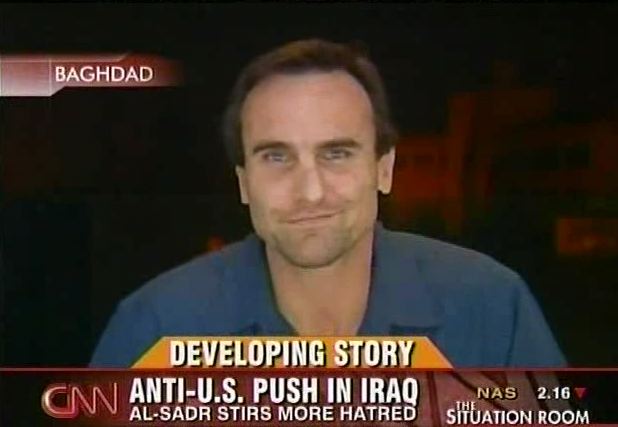TSR: "He's saying...look at what I can still do."

Click photo to play
Length: 3:36
WOLF BLITZER: A powerful picture today of anti-American anger in Iraq. Thousands of Shiite protesters marched in the holy city of Najaf marking four years since the Iraqi capital fell to U.S. forces. The demonstration was called by the radical anti-American Shiite cleric Muqtada al Sadr. He appears to be taking some dramatic new steps to try to stir up more Iraqi hatred of the United States.
And joining us now, our correspondent in Baghdad, Michael Ware. Michael Ware, the comments coming from Muqtada al Sadr, these purported statements coming from him urging his followers -- and we know there are plenty of Shiite followers of this radical Shiite cleric -- to not fight Iraqis but to fight, to resist the occupiers. That's a clear reference to the United States. What's going on?
MICHAEL WARE, CNN CORRESPONDENT: Well, this is Muqtada politically rejockeying and militarily preparing the ground for what may come, whatever contingencies lie ahead. He was very careful with these words. He didn't actually exhort his followers to launch attacks. He's just said to his militia and to the "brothers" in the police force and the Iraqi army, to "stop fighting each other because this is what the enemy, the occupier, America, wants. Let's focus on the true enemy, which is America."
Now, this comes as over the weekend one of the strongholds of his militia has been attacked by Iraqi and American forces and there's been intense fighting. He calls for this rally to mark the fourth anniversary of the war. Instead of celebrating liberation, it's an anti-American demonstration where the military says only up to 7,000 took the streets. But you can see the pictures of the holy city of Najaf. Iraqi officials say it was tens of thousands. Now American generals are trying to put a good spin on this. They say this is a mark of democracy. This is what we came here to let them do, to have freedom of speech. But this is freedom of speech, a gathering by thousands of supporters of an armed anti-American militia backed by Iran. Wolf?
BLITZER: And those pictures very dramatic. We see American flags being burned. We see these followers being told by Muqtada al Sadr in effect, don't fight Iraqis. Don't cooperate with the occupiers, the United States. But he's also suggesting one step further to the Iraqis, his followers, don't work with America. Don't cooperate. Don't walk with them in any way. What's the message to those Iraqi military and police forces who do cooperate with the U.S.?
WARE: Well, obviously, they have to be very cautious individuals. Now, it's been well established that no one from Muqtada's military forces, no one from his parliamentary faction and none of his officials in the government -- remember, Muqtada al Sadr, the anti-American cleric, owns several ministries in this government, including health. He runs the hospitals in this country -- none of those officials will talk to Americans. Now what we saw after the start of the surge or the Baghdad security plan on February 14 is Muqtada leave the scene. American intelligence says he went to Iran. Well, this demonstration is him putting himself back on the scene. He's saying, "no matter where I am, look at what I can still do."
BLITZER: Michael Ware in Baghdad for us. Thanks, Michael.
WARE: Thank you, Wolf.
